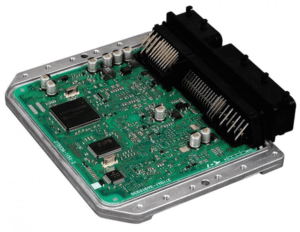Table of Contents

What is an Electronic Control Module in a Car?
An electronic control module, otherwise known as a motor control module (ECM), is a PC-based system in a vehicle that manages and controls various capacities related to the motor and transmission. In addition to monitoring other things, it receives information from various sensors and controls fuel injectors and other electrical components, initiates drive patterns, and is responsible for emission control.
Components of an Electronic Control Module”
- Fuel Injection: The ECM adjusts fuel injection to select the desired engine output and maintain ideal engine operation.
- Ignition Timing: The ECM also manages ignition timing to optimize engine performance.
- Air/Fuel Ratio: The ECM adjusts the air/fuel ratio to ensure efficient engine operation.
- Transmission Control: The ECM controls hydraulic pressure to handle the movement of the transmission and engage and disengage gears.
- Emission Control: The ECM is responsible for checking and regulating the exhaust system to reduce harmful pollutants.
- Engine Diagnostics: The ECM consistently screens various engine and transmission parameters, identifies problems, and stores Diagnostic Trouble Codes (DTCs) when necessary.
- Mileage: By controlling engine operation and managing transmission shifts, the ECM helps improve fuel efficiency and reduce the vehicle’s impact on the environment.
Signs that an Electronic Control Module Needs to be Replaced
- Engine Misfire: If the ECM is not functioning properly, it can result in an engine misfire, which can cause the engine to shut down and performance to decrease.
- Engine Stall: If the ECM is unable to control the engine’s operation, it can result in an engine stall or shutdown.
- Warning Light: The ECM is responsible for monitoring various engine and transmission parameters and if it detects any issue, it will store diagnostic trouble codes (DTCs) and trigger a warning light on the dashboard.
- Decreased Fuel Efficiency: If the ECM is not managing the engine and transmission optimally, it can result in decreased fuel efficiency.
- Transmission Issues: If the ECM is not managing the transmission properly, it can result in transmission issues such as slipping, harsh shifting, and delayed shifting.
Cost of Replacing an Electronic Control Module
The cost of replacing an ECM (Electronic Control Module) in a vehicle can vary based on the make, model, and location of the vehicle’s maintenance and repair. On average, the cost can range from $600 to $2,500, including parts and labor. However, the cost may be higher for luxury and high-performance vehicles.
It is important to note that replacing an Electronic Control Module is a complex and time-consuming process and is typically performed by a professional mechanic. Attempting to replace the ECM without proper training and tools can cause further damage to the vehicle and result in additional costs.
Conclusion
The Electronic Control Module is an essential component in a vehicle’s engine management system, playing a crucial role in managing various functions related to the engine and transmission. If the electronic control module is not functioning properly, it can result in engine problems, stalling, decreased fuel efficiency, and transmission issues. If you suspect your car’s electronic control module is not working correctly, it is important to have it checked and repaired by a professional mechanic. Replacing the Electronic control module can be expensive, but it is necessary to ensure the safe and reliable operation of the vehicle.
Recommendation
- 1. Regular maintenance: Regular maintenance of the vehicle, including engine tune-up and oil change, can help prevent problems with the engine and other components, including the electronic control module.
- 2. Use genuine parts: It is important to use genuine parts from the manufacturer when replacing the ECM to ensure proper fit and compatibility.
- 3. Avoid Harsh Driving Conditions: Harsh driving conditions, such as excessive idling, aggressive acceleration, and towing heavy loads, can put additional stress on the engine and electronic control module and can lead to issues.
Famous Anti-lock Braking System (ABS): Working & 3 Benefits – TheAutoEngineer.com
